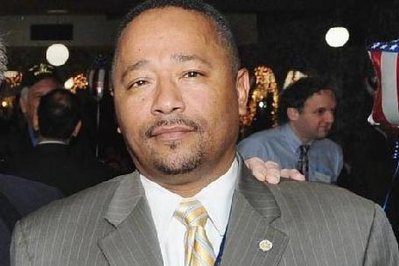The Philadelphia Court of Common Pleas currently has two openly LGBT judges on the bench, and Leon King is looking to up that number by one.
King, an openly gay civil-rights attorney and the city’s former prison commissioner, headed to Harrisburg Tuesday morning armed with signed petitions to get his name on the May primary-election ballot.
King announced his intention to run for Common Pleas in 2009, but said he withdrew from the race at the request of local Democratic leaders for strategy reasons.
He’s back in this year, however, and looking forward to bringing his diverse background into a new realm.
“I’ve been involved in the criminal-justice system from I think one of the most unique points of view of anyone in the city and certainly in this judicial race,” the candidate said.
King earned his law degree from Temple University in 1991 and, two years later, became one of the founding members of the city Law Department’s civil-rights division, in which he represented police officers and other civil servants in suits against the city.
He became general counsel to the Philadelphia Prison System in 1997 and, in 2002, was named commissioner — a position he held until Mayor Nutter’s administration began in 2008. After leaving the prison system, he worked as the director of legislation for City Councilman Frank Rizzo and now operates his own private practice.
He recently launched a high-profile suit against the city on behalf of a local bar owner who contends he was harassed by police officers and Department of Licenses and Inspections workers.
Throughout all of his experiences, he said he’s grown to believe that many of the flaws in the criminal-justice system stem from the bench.
“Based on my legal experience, it seems like judges are really key to solving the problems we have in criminal courts and family courts as well,” he said. “With the delays and the inefficiencies, it seems like we don’t have enough judges who understand that while they can really only control their courtrooms, they still have a responsibility to engage the public, lawmakers and other judges to improve the effectiveness and fairness of the system. That’s why I’m running. I want to be the type involved in changing the core things that need to be changed.”
King noted that when he was recently in court, he witnessed a judge sentence a man who was accused of driving under the influence of cocaine and later alcohol, whom King said appeared to be mentally ill and drug-addicted, to several days in prison followed by a highway-safety course.
King suggested that in such instances, judges need to be open to exploring options that address the larger context of the defendant’s arrest, a lesson he said he’s seen both as an attorney and a prison official.
“He wasn’t arrested because he didn’t know how to drive. Why is he going to driver-safety school when there are likely other alternatives to address the real situation going on here? That’s something I’d be an advocate for and something I think distinguishes me from other candidates. I’ve been through it, I’ve planned for it and I’ve studied it. Judges need to be educated about all alternatives.”
While he was prison commissioner, King worked to open connections among HIV/AIDS agencies and the inmate population, instituted rapid HIV testing within the system and spearheaded a plan that allowed condoms to be placed on the commissary list.
King said he was the first commissioner to specifically recruit LGBT employees, which he did in a campaign in the Gayborhood, and which he said exemplifies his longstanding commitment to being an “out” leader.
“I think I’ve been a witness for the LGBT community in all that I’ve done, so I’d really appreciate the support of the community now,” he said.
While garnering votes on Election Day is important, King said that knowing the LGBT community is behind him is just as integral.
“I’ve been out there as an openly gay man and taken risks and done things that I think a lot of other people haven’t done, so having the community behind me would really mean a lot to me personally. We, as a community, need to support our own, and it’ll be real important for me to have that moral support.”
For more information, visit www.leonking.org.
